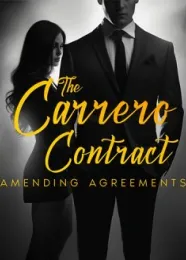Chapter 3. The Gilded Cage
The Altieri mansion loomed like a marble cathedral of obedience.
Sunlight poured through the stained-glass skylight, splintering into fractured color across the polished floor of the foyer. Two guards in dark suits dragged Margherita through the doors, their hands clamped on her arms like iron cuffs. Her heels scraped the tiles, the sound sharp in the silence.
By the grand staircase, Simona was waiting.
She stood, poised in a cream silk blouse and tailored trousers, her blonde hair perfectly smooth, a string of pearls resting at her throat. She looked more like a portrait than a person—composed, cold, untouchable.
Her eyes swept over Margherita once, from the tangled hair to the wrinkled black dress and borrowed men’s jacket. Disgust flickered—delicate, fleeting.
“Take her upstairs,” she said. Her voice carried like glass breaking.
The guards nodded and half-dragged Margherita up the stairs.
“Simona, please—”
But her guardian didn’t answer.
They reached Margherita’s room—the one that had once felt like her refuge and now felt like a cell—and shoved her inside. She stumbled forward, catching herself on the edge of the bed.
The door clicked behind her. When she turned, Simona was already there, closing it with quiet finality. The lock slid into place with a soft, unmistakable sound.
For a long moment, neither spoke.
Simona crossed the room, every step measured. She looked around—at the half-open books on Margherita’s desk, the art sketches tacked to the wall, the forgotten pointe shoes tossed in the corner—and her mouth curved slightly, not quite a smile.
“This is how you repay me?” she said softly. “By humiliating yourself?”
“I didn’t—”
“Look at you.” Simona’s tone sharpened. “I let you live in the city, Margherita. I trusted you. You said you’d be writing your paper. That you were studying. And instead, you come back looking like—” She waved a manicured hand, as though the word itself were too vulgar. “Like something you picked up off the street.”
Margherita’s face burned. “I was with my classmates—”
“Oh, your classmates.” Simona’s voice turned mocking. “The ones who convinced you to drink and dance and throw away the dignity I’ve spent years building for you?”
“That’s not—”
“Enough.” Simona’s voice cracked through the air.
Margherita fell silent.
Simona sighed, smoothing her blouse as if to erase the unpleasantness of emotion. “I was generous. Too generous. Your father’s name still means something in this city, despite his mistakes. I wanted you to have a chance to make something of yourself. Not with degrees or essays, but with grace. With poise.”
She turned her gaze to the discarded pointe shoes. “I told you ballet would refine you. That it would teach you discipline. But instead, you’ve been skipping your lessons.”
“I had exams,” Margherita whispered. “It’s my final year. I just needed—”
“You don’t need a degree, Margherita. You need a husband.”
The words struck like a slap.
Simona’s tone softened, almost tender. “Education doesn’t make a woman valuable. Presentation does. Elegance. Restraint. That is what keeps you safe in this world.”
Margherita swallowed hard. “Please. Just let me finish this year. I’ll do anything you ask afterward.”
Simona regarded her for a long, unblinking moment. “You already had your chance.”
She crossed to the window and pulled the curtains wide. Sunlight spilled over Margherita’s reflection in the glass—disheveled hair, tired eyes, the borrowed jacket dwarfing her shoulders. Simona’s voice was calm when she spoke again.
“From now on, you will stay here. No more nights out. No more pretending to be something you’re not. You will attend your ballet classes and nowhere else. You’ve gained weight—your posture is slipping. That will be corrected.”
Margherita’s lips parted, her throat closing around the words. “Simona—” She took a deep breath and asked carefully, “And the university?”
“You will withdraw immediately.”
The air went thin. “It’s my final year,” she whispered. “I’ve worked for this—”
“It’s over.” Simona turned, her expression smooth and final. “You will thank me one day.”
Her perfume trailed behind her as she walked to the door. She unlocked it, then glanced back.
“I will have the housekeeper bring you something light for lunch,” she said. “Salad only. You need to recover your figure.”
The door shut with a soft click.
Margherita stood frozen, sunlight searing the tears she refused to shed.
Outside, she could hear the faint echo of heels clicking down the marble corridor—graceful, deliberate, final.
Simona’s voice carried faintly back through the hall: “Double the security. She doesn’t leave without my permission.”
Margherita’s knees gave out. She sat heavily on the bed, pressing her hands to her face.
The scent of lavender clung to the room, suffocating.
It was the smell of her new prison.
***
The suite still held the ghost of her presence when Ezio walked in.
The maid waited near the door, pale and trembling, clutching a tray with untouched coffee. The air was thick with fear and the scent of espresso.
“She just walked out?” Ezio asked quietly.
The woman nodded, voice shaking. “Sì, Signore. She said she was in a hurry. I thought she had your permission—”
He smiled thinly. “Next time, don’t think.”
Dario, leaning against the wall, exhaled through his nose. “Boss, she wasn’t a prisoner. What were we supposed to do, tie her down?”
Ezio glanced at him, unimpressed. “You’d be surprised how effective that can be.”
Dario lifted a hand in mock surrender. “I’m just saying—she looked harmless. Confused, a little drunk, nothing more.”
Ezio crossed the room, his eyes sweeping over the bed—sheets smoothed, the armchair empty except for the faint indent where her purse had been. Her shoes were gone too.
He pressed a thumb and forefinger to his brow. “Find out who picked her up.”
“Already did,” Dario said. “Her stepmother’s men showed up outside her building less than an hour later. Black SUV. Took her home.”
Ezio’s expression didn’t change, but his jaw worked slightly. “Her stepmother?”
Dario picked up a file folder and flipped it open. “Yeah. Background check came in. Indeed, her name’s Margherita Altieri. Twenty-four. Stepdaughter of Simona Altieri. Father’s the late Domenico Altieri.”
Ezio looked up slowly. “The same one whose death started that whole mess with the Benedetti syndicate?”
“The very one.” Dario nodded. “Officially, the Altieri estate’s broke—everything seized after Domenico’s little empire fell apart. But rumor has it he stashed away millions. Offshore accounts, real estate under shell names, gold—no one ever found it. And Margherita’s the only legitimate heir.”
Ezio turned toward the window, the sunlight catching on the silver rings across his knuckles. “So the stepmother’s sitting on a ghost fortune she can’t touch unless the girl cooperates.”
“Pretty much.” Dario poured himself a drink from the minibar, casual as ever. “Simona’s something of a celebrity, by the way. Used to run in Benedetti circles—high-society type, polished, cold. Surprised you two never crossed paths.”
“She’s hard to miss,” Ezio said dryly. “But she’s careful. And apparently very good at hiding things.”
He took the file from Dario and flipped through it, scanning the few photos inside.
Most were old—a girl in an elite school uniform, her hair neatly braided, eyes too serious for her age. Another photo showed Domenico Altieri with his much younger wife, Simona, and a seventeen-year-old Margherita standing between them.
Ezio studied it for a long moment. The girl’s posture was perfect, chin lifted, hands folded at her waist—the kind of grace that came from instruction, not ease. Her smile didn’t quite reach her eyes.
Still, his mind supplied the memory of the night before—the ropes, the fear in her eyes, the skimpy dress, the smudged lipstick. And then the way she’d looked asleep, vulnerable, far too human for the world she’d come from.
He pushed the thought aside.
“Maybe she’s just another spoiled rich girl,” he said, his voice cooling. “Daddy dies, she inherits a name, gets restless, sneaks out to taste real life for a night, ends up in the wrong room. Happens all the time.”
Dario smirked. “You sound almost sympathetic.”
Ezio gave him a look that killed the smile. “Hardly. I just like to know when someone like that stumbles into my territory.”
He set the file down. “Keep an eye on the widow. Discreetly. If she’s hiding money—or anything else—I want to know.”
Dario nodded. “Got it. You think the girl’s worth tracking, too?”
Ezio slipped his hands into his pockets. “For now, she’s just a name on a page.”
He turned toward the window again. The city stretched below, glittering and corrupt under the afternoon sun.
“But if she shows up again,” he said quietly, “we’ll be ready.”









